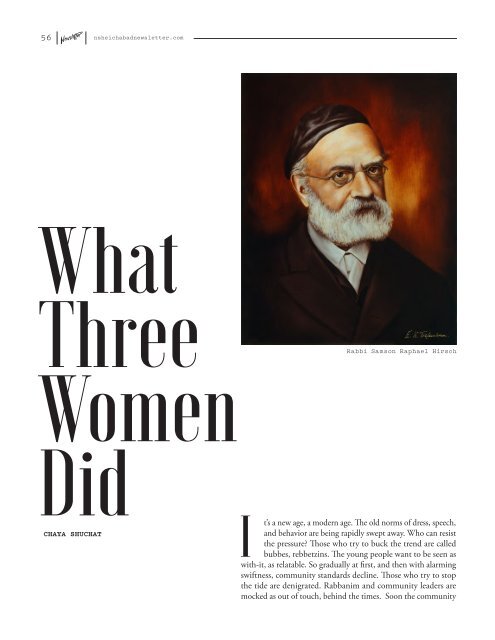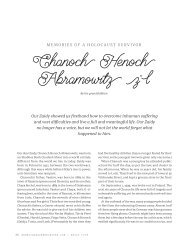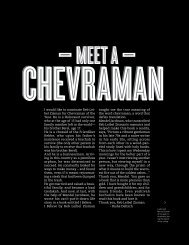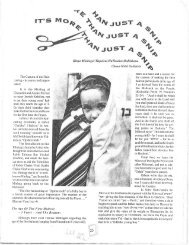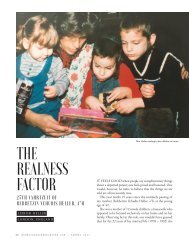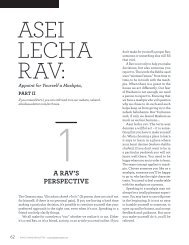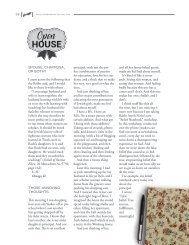You also want an ePaper? Increase the reach of your titles
YUMPU automatically turns print PDFs into web optimized ePapers that Google loves.
56 nsheichabadnewsletter.com<br />
What<br />
Three<br />
Women<br />
Did<br />
CHAYA SHUCHAT<br />
Rabbi Samson Raphael Hirsch<br />
I<br />
t’s a new age, a modern age. The old norms of dress, speech,<br />
and behavior are being rapidly swept away. Who can resist<br />
the pressure? Those who try to buck the trend are called<br />
bubbes, rebbetzins. The young people want to be seen as<br />
with-it, as relatable. So gradually at first, and then with alarming<br />
swiftness, community standards decline. Those who try to stop<br />
the tide are denigrated. Rabbanim and community leaders are<br />
mocked as out of touch, behind the times. Soon the community
February 2017<br />
57<br />
is hardly recognizable.<br />
The Jewish community of Frankfurt-am-Main, Germany, was<br />
a center of Jewish life for over 500 years. It was home to great<br />
Torah luminaries such as Rabbi Yehoshua Falk, author of Pnei<br />
Yehoshua, and Rabbi Yeshaya Hurwitz, the Shaloh Hakadosh,<br />
author of the Shnei Luchos Habris.<br />
In the late 1700’s, the haskalah movement, founded by Moses<br />
Mendelssohn, swept through Germany. Its mission was to modernize<br />
Judaism, to make it more “rational.” Echoing the teachings<br />
of the ancient Greeks, who tried to make the Jews forget the Torah<br />
of Hashem, the haskalah movement tried to eliminate the study<br />
of Gemara and the practice of halachah. Chumash was studied as<br />
literature, as language arts. They attempted to sever the connection<br />
between Jews and G-d, R”l, turning Judaism into a culture,<br />
not a religion, and certainly not a way of life.<br />
Unfortunately, their efforts were all too successful in eroding<br />
generations of vibrant Jewish life in Germany. By 1850, the<br />
Jewish community of Frankfurt was practically defunct. There<br />
were no active chadarim or mikvaos, no shochtim, no Orthodox<br />
shuls. A young rabbi, Samson Raphael Hirsch, arrived in<br />
Frankfurt determined to reverse the tragic trend. He, in turn,<br />
inspired three young women who were the key to the Jewish<br />
revival of Frankfurt, as recounted by the Frierdiker Rebbe in his<br />
Igros Kodesh, vol. 3, p. 524:<br />
In the winter of 5667 (1907) I was with my father [the<br />
Rebbe Rashab] in Frankfurt, Germany. Rabbi Breuer z”l came<br />
to visit my father and in the course of conversation he mentioned<br />
that the frum community in Frankfurt now numbered<br />
thousands of families.<br />
After Rabbi Breuer left, my father told me that when he<br />
was in Berlin in 5645 [1885] he visited with Rabbi Azriel<br />
Hildesheimer, who showed him great respect since he had<br />
known his father, my grandfather [the Rebbe Maharash].<br />
When my father came to visit, Rabbi Hildesheimer introduced<br />
him to a very respectable woman and said, “This distinguished<br />
woman is one of the first students of my teacher, Rabbi Samson<br />
Raphael Hirsch, and one of the three matriarchs of the<br />
Frankfurt Jewish community.<br />
“Mendelssohn’s haskalah movement destroyed—lo aleinu—<br />
the German Jewish community in general and the community<br />
of Frankfurt in particular. When my teacher Rabbi Samson<br />
Raphael Hirsch came to Frankfurt, there were no Jews left<br />
who kept Shabbos, kashrus or taharas hamishpachah. Rabbi<br />
Hirsch founded two chadarim, one for boys and one for girls,<br />
and taught them Torah, a matter that is already widely known.<br />
“The honored woman who is standing here,” said Rabbi<br />
Hildesheimer, “and two of her friends were the first three<br />
kallahs in Frankfurt to accept upon themselves to cover<br />
their hair, keep taharas hamishpachah and [other] mitzvos…<br />
This had an effect on others, and from them grew the<br />
Torah Sources<br />
for Hair Covering<br />
After<br />
Marriage<br />
“Disruption of spiritual<br />
consciousness<br />
will befall a man who<br />
allows his wife to<br />
expose her hair; this<br />
[the covering of a<br />
woman’s hair] is one<br />
of the foundational<br />
principles of modesty.<br />
A woman who lets her<br />
hair be seen in order<br />
to appear attractive<br />
causes poverty to her<br />
home, spiritual inferiority<br />
to her children<br />
and causes a negative<br />
spiritual influence to<br />
reside in the home…<br />
If all this applies in<br />
one’s own house<br />
certainly in public<br />
places, and certainly<br />
other brazen acts<br />
of immodesty….”<br />
(Zohar, Parshas<br />
Naso, 125b-126b)<br />
Then the kohen<br />
shall stand the<br />
woman up before<br />
Hashem and expose<br />
the [hair on the] head<br />
of the woman; he shall<br />
place into her hands<br />
the remembrance<br />
meal offering, which<br />
is a meal offering of<br />
jealousies, while the<br />
bitter curse-bearing<br />
waters are in the<br />
kohen’s hand. (Bamidbar<br />
Parshas Naso<br />
5:18)<br />
Rashi on “and<br />
expose”: He unravels<br />
the plaits of her<br />
hair to humiliate her.<br />
From here [we derive]<br />
that a bared head is<br />
considered a disgrace<br />
for the daughters of<br />
Israel. — (Kesubos<br />
72a)<br />
Zohar (brought by<br />
poskim to Shulchan<br />
Aruch Orach Chaim,<br />
siman 75)
58 nsheichabadnewsletter.com<br />
strong, G-d-fearing community of<br />
Frankfurt-am-Main.”<br />
The “Problem” of Hair Covering<br />
The Rebbe writes in a letter to an<br />
individual:<br />
In response to your question, quoting<br />
your words, about “the problem of<br />
hair covering, and what this custom is<br />
based upon”:<br />
It is an explicit law and not only<br />
a custom of the Torah that a woman<br />
(who is married, obviously) is to cover<br />
her hair, kisui harosh. Moreover, from<br />
the great reward received for performing<br />
this law one can appreciate that<br />
there is great import to fulfilling this<br />
law....<br />
As the Zohar states in Parshas<br />
Naso [quoted in Mishnah Brurah,<br />
Laws of Krias Shema, Chapter 75], and<br />
I choose to quote only the blessings<br />
mentioned there, omitting the negative<br />
aspects resulting from failure to comply<br />
with this law: “Her children will enjoy<br />
increased stature over other children;<br />
moreover, her husband shall be blessed<br />
with all blessings, blessings of above<br />
and blessings of below, with wealth,<br />
with children and grandchildren, etc.”<br />
I would also add to the above that it boggles the mind that<br />
this should be a “problem” for anyone who has a spark of faith in<br />
their heart and desires that their married life be truly fortunate and<br />
blessed. …these blessings and good fortune extend to the husband,<br />
wife and the children that G-d will bless them with.<br />
Can there be any comparison whatsoever of the unpleasantness<br />
(if you wish to say that there is unpleasantness) that exists<br />
in kisui harosh in comparison to G-d's blessings, the blessings<br />
of He Who formed Man and created and conducts the world?!<br />
Such an attitude is exceedingly irreverent, even if there were to<br />
be but a scintilla of assurance about this requirement, and surely<br />
when this matter is stated explicitly.<br />
It is self-understood that I am aware of the objection to the<br />
above, to the effect that there are many who do not observe this<br />
law. But this question already exists for thousands of years, for<br />
“you are a minority among the nations,” and how is it that “our<br />
laws differ from all other nations”? And unfortunately, within<br />
the Jewish people there are still to be found individuals who for<br />
the time being publicly desecrate the Shabbos and even intermarry,<br />
Heaven forfend.<br />
The honored woman<br />
who is standing<br />
here and two of her<br />
friends were the<br />
first three kallahs in<br />
Frankfurt to accept<br />
upon themselves<br />
to cover their<br />
hair, keep taharas<br />
hamishpachah and<br />
[other] mitzvos…
February 2017<br />
59<br />
The Women’s Circle on<br />
a Wednesday morning.<br />
Surely this does not at all affect in the very least, G-d forbid,<br />
the vital aspects of our Torah, the Torah of Life and its mitzvos<br />
concerning which Scripture states, “You shall live by them,”<br />
just as the making of the Golden Calf in its time (close to the<br />
time of receiving the Torah) did not diminish one iota from the<br />
importance of the Ten Commandments, and subsequently the<br />
entire Torah and all its commandments up to the present day.<br />
Finding ourselves just several days before Purim, [we read in<br />
the Megillah that] objections such as the above [that “our laws<br />
differ from all other nations,” etc.] was the complaint of Haman,<br />
whose conclusion was not only the spiritual destruction of the<br />
Jewish people, but “to annihilate all the Jewish people, from<br />
young to old, children and women.”
60 nsheichabadnewsletter.com<br />
For the existence of the Jewish people in all places is exclusively<br />
through performance of the Torah and its mitzvos, that<br />
were given by the One G-d to the “one nation on earth.”<br />
(Excerpted from Igros Kodesh, Vol. 23, pp. 345-346)<br />
Why Sheitel is Best The Rebbe speaks:<br />
Wearing a sheitel has a beneficial impact on children and<br />
grandchildren, sustenance and health, as the Zohar states<br />
(III, 126a) that it affects children, health, and sustenance.<br />
One should not ask, I know of a woman who does not<br />
wear a sheitel and still things go well for her regarding children,<br />
health, and sustenance, as well as life in general.<br />
First, we do not know what is happening with the other<br />
person, what type of travails they are undergoing; no one<br />
tells the other about all that transpires in their life.<br />
Second, we are not to look at what is happening with the<br />
other; we are to do that which G-d commands us to do.<br />
[The Rebbe mentions here that “we are a minority among<br />
the nations.”] There are more gentiles than Jews in this world,<br />
and things are going well for them. Does that mean that we<br />
are to imitate their ways? Were we to act in such a manner,<br />
the Jewish people would have ceased to exist, G-d forbid,<br />
a long time ago.<br />
When a Jewish woman walks in the street without<br />
a sheitel there is no [discernible] difference between her and<br />
others. However, when she wears a sheitel one can tell that<br />
here is a Jewish religious woman. It is not necessary to go in<br />
the streets loudly proclaiming “I am religious,” but ... who<br />
is one embarrassed of? Of one’s friend? Should they say that<br />
‘here walks a religious Jew,’ what is the shame of the matter?!<br />
Does such conduct require much mesirus nefesh? If, Heaven<br />
forfend, there is a lack of food to eat, the children are hungry,<br />
and it is necessary to keep Shabbos in one’s work and<br />
business, this requires great mesirus nefesh. And still, without<br />
a doubt Shabbos is kept.<br />
****<br />
The difference between a sheitel and a kerchief is the following:<br />
It is easy to take off a kerchief, which is not the case<br />
with a sheitel. When one is at a gathering and wears a sheitel,<br />
then even if President Eisenhower were to enter the room<br />
she would not take off the sheitel. This is not so with a kerchief<br />
which can easily be taken off.<br />
The objection that wearing a sheitel was not made a<br />
condition of the match prior to the wedding is not at all<br />
convincing. Does wearing a sheitel have anything to do with<br />
keeping one’s word? It should be worn because it brings<br />
true good fortune to the husband, the wife, to children and<br />
grandchildren.<br />
... Wearing a sheitel is especially appropriate now, when<br />
one can obtain a sheitel in various shades, which look even<br />
nicer than one’s own hair.<br />
Let the woman ponder this matter. It doesn’t take an hour<br />
or even a half-hour of contemplation. Why doesn’t she really<br />
want to wear a sheitel but only a kerchief: because she knows<br />
that a sheitel cannot be taken off when she is walking in the<br />
street or is at a gathering, while a kerchief can be moved<br />
all the way up and sometimes taken off entirely, as known<br />
from practice.<br />
It is possible that she will say that she will wear a kerchief<br />
properly. If she does so, then surely it is well. But experience<br />
has shown that this is not the case.<br />
Why place oneself in the path of temptation? We beseech<br />
G-d prior to our prayers, “Do not bring us into temptation.”<br />
Who is greater than King David, concerning whom<br />
the Gemara states that he completely vanquished his Evil<br />
Inclination, and nevertheless he did not withstand the test.<br />
Even the reformers do not say that a sheitel is counter to<br />
ethics, only that it is old-fashioned. What then is there to<br />
fear? Let it be said that here goes a Jewish daughter.<br />
My father-in-law related that the city of Frankfurt had<br />
very religious Jews; their piety made a name for them over<br />
all of Germany. This notwithstanding the fact that previously<br />
Frankfurt was filled with freethinkers. All this came<br />
about in the merit of three women who were firm in their<br />
resolve to wear a sheitel, observe family purity and provide<br />
their children with a kosher education. This had an<br />
effect on the men and other women. With the passage of<br />
time the community of Frankfurt changed for the better.<br />
From a sichah of the Rebbe, Rosh Chodesh Elul 5714<br />
The above excerpts are printed in Beautiful Within, a book of<br />
the Rebbe’s talks and letters on tznius translated by Rabbi Sholom<br />
B. Wineberg and published by Sichos in English (SIE.org).<br />
This article is based on hand-outs prepared by<br />
Rabbi Mordechai Lipskier for The Beis Medrash<br />
Women’s Circle (TBM<strong>WC</strong>). TBM<strong>WC</strong>, directed by Mrs.<br />
Chanel Lipskier and Mrs. Dvora Lakein, meets<br />
weekly at 580 Crown St. on Wednesday mornings<br />
at 9:30 to learn Chassidus and halachos and to<br />
enjoy lively discussions about topics pertaining<br />
to women. Babies are welcome; snacks and toys are<br />
provided.<br />
TBM<strong>WC</strong> also has special evening events throughout<br />
the year with speakers from all over the world. Be<br />
a part of it! To receive information about upcoming<br />
events, or to support the work of the <strong>WC</strong>,<br />
email wc@thebeismedrash.com.


